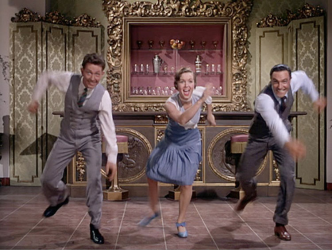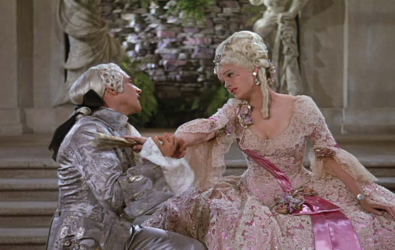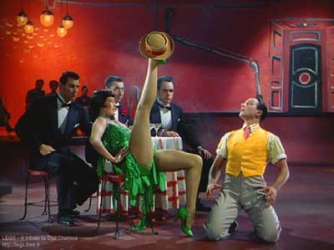The Flower avoided all films over the past two weeks to make sure she was over her cold well enough to see and enjoy this film. She was, as the kids say, “hype” about this 1951 musical classic, in all of its Technicolor glory. The Flower has become so entranced by the style of the classics we’ve seen, she’s vowed to bring back Technicolor and proper set design, wardrobe and whatever else it takes to Make Movies Great Again.

“I’m happy again…”
A novice—a rank amateur, some would say—might worry about That Much Hype before a movie, but 2016 taught me that time has a way of picking winners. So, despite the occasional quips of “So, when does Malcolm McDowell show up?” I was not the least bit surprised that this film was a Huge Hit with her, as well as with The Boy and His Girl. And, really, with everyone. For some revivals, the theater uses a smaller auditorium but for this, they used one of the big ones, and it was packed.
And people clapped after some of the dance numbers, especially “Good Morning” and “Make ’em Laugh” because, really, what else can you do? I’m not really a big dance guy but I was impressed, repeatedly, by the numbers. (I’d seen the film before but only on TV which, meh. Yeah, I’m a snob. You should know that by now.)

You can’t even see the flesh-colored bandage used to hide the burst blood vessels in Debbie Reynolds’ feet.
Almost ironically, the weakest part of the film is the opening number where the three leads sing the title song at a traditional tempo while stamping around in galoshes. “Singin’ in the Rain” had been a modest hit back in 1930 and appeared in half-a-dozen pictures before this one, but Gene Kelly’s brilliant decision to slow it down and give it a less frantic and more beatific tempo and style does as much for the song as Dooley Wilson’s relaxed-swing vibe does for “As Time Goes By”.
The hook of the film was pretty hoary even at the time: A silent movie duo finds their careers on the rocks with the advent of sound. Oh, he’s okay (Gene Kelly) but she (Jean Hagen) sounds like a gangster’s moll. Hagen’s performance is unquestionably brilliant. If she had just done a screechy voice through the whole thing, it would’ve been torture every time she came on screen. Instead, she makes these wonderfully weird attempts to sound “proper” and ends up with an accent hash of bad English, Queens and sorta proto-Valley girl. It’s a marvel.

She’s amazing, but probably overlooked in hindsight, since she has no song and dance numbers.
Donald O’Connor is, of course, brilliant. He’s also remarkably handsome, which isn’t something that was obvious (to me) on the small screen. Especially for a guy who’s comic relief, he supports the film easily and plays off Gene Kelly easily.
From what I can tell, nobody liked Gene Kelly (in terms of working for him on this set). The stories one hears are similar to those one hears about Fred Astaire. These guys were perfectionists and they had Big Tempers. In addition, he was apparently trying to get out of his contract with MGM. The beauty of this is how absolutely none of that ever shows up on screen.
Which brings us to the late, great Debbie Reynolds. Much like O’Connor, she suffered tremendously at Kelly’s hands, but neither of them would exactly say so. (Kelly would, and did, admit this much later in life.) And yet this 19-year-old with no dance experience doesn’t just keep up with the two experienced hoofers, she looks like she’s doing it easily, like she was born dancing and nothing could be more natural to her than playing off the greatest dancers of the era. Not just easily, but joyfully.

Cyd Charisse’s legs are ALSO in the movie.
One of the recent retrospectives I read compared Debbie Reynolds with her daughter, Carrie Fisher, in terms of how they viewed life. To the end of her days, Reynolds seemed to go through life with a positive, grateful attitude, while Carrie Fisher could scarcely countenance such a thing. Fisher was from the Holden Caulfield era of everything-not-scuzzy-is-fake, and though I think (to some degree) she overcame some of this, it’s part-and-parcel of the ’60s tradition of cynicism and degradation. At some point, entertainers forgot that what they give people is a vision of beauty, wonder and, yes, fantasy; of states much higher than can be attained in our daily lives.
This is why a movie like this, rare even in the most upbeat of eras, is like a unicorn today.

One thought on “Singin’ In The Rain (1951)”